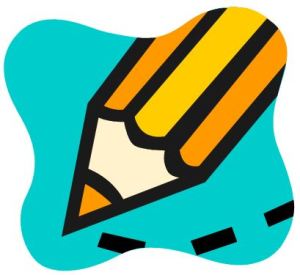 Students learn from their mistakes, they say.
Students learn from their mistakes, they say.
I agree. They learn something. But often what they are learning is not what the teacher thinks she is teaching.
M. Moriarty said it well in a comment on an earlier post:
To this day I cannot bear a red pen… it signals math failure to me – and try as I might – I never did learn from my many many mistakes in grade school math – what I learned was that I wasn’t very good at math and that after a while it really wasn’t any use to try….
English teachers have been marking errors in student writing for centuries. Red pens. Blue pens. “I mark every mistake.” “I give two positive points on the paper before the negative points.” “I mark all the instances of only one or two errors.”
As a group, we English teachers have failed to notice some important points about marking errors in student writing:
- It is useful only to students who make very few errors.
- It is useful only to students who are confident in their ability to learn.
- Students with the most to learn, the ones who make lots of errors, usually pay little attention to their papers when they come back all marked up. That’s why I don’t give grades.
- Teachers spend many hours marking, work that students do not value or make use of. As a result, they lose self respect; they begin to feel resentful, and blame students for their failure to pay attention, instead of finding fault with the marking method.
Students are sometimes in a frame of mind to learn from their mistakes, and sometimes not. If a student says, “I’m not sure if I’ve got this right here. Is this the way you do it?” I can tell by the question that he is in a learning mindset, and I can say, “No, you’ve got that part wrong. Let me show you…”
Adult literacy students, ABE and GED students, come to us with school failure in their pasts. When something we do, (like marking their many errors) reminds them of past failures, it re-ignites those old feelings of incompetence, and reminds them of past lessons: they have learned that they are too stupid and lazy to succeed in school. This is not a learning mindset.
For our own good, to improve our job satisfaction, to maintain our self-respect by not doing useless work, we need to notice whether students are in a mindset to learn. When both teacher and learners are in a learning mindset, life at school is a beautiful thing.
When students are not in a mindset to learn, it is my job to help them figure out what conditions are best for them to learn in. Some of the things they need are beyond my scope, but many fall into my domain. Then it is my job do what I can to provide those conditions, and especially to eliminate whatever I am doing that takes them out of the learning mindset.
Perhaps I should call this whole blog “What I Learned from Making Mistakes.”

Pingback: The Best Posts, Articles & Videos About Learning From Mistakes & Failures | Larry Ferlazzo’s Websites of the Day…
Pingback: Learning from Our Mistakes | Modern Education |...
Pingback: Educational Policy Information
Pingback: Four Good Links On Classroom Instruction | Larry Ferlazzo’s Websites of the Day…
Learner: Do you want to read this?
Me: Sure.
Learner: Can you mark it for me?
Me: I can help you edit it – yes. What am I looking for? Capitals? Commas? Word choice? Over-all sense?
Learner: All of it. Whatever I got wrong.
Me: Nope. I can only edit for one thing. You tell me what it is you’re concentrating on right now, and I’ll help out.
It’s not a very good solution, but it’s as close as I can get. The other part is that I let my learners see me asking others to proof-read my work, and sometimes I talk about proofing strategies. Anyway, it’s always ‘editing’ or ‘proof-reading,’ never ‘marking’ except in the case of a more or less finished GED-type essay.
Thanks for letting us into your practice, Wendell.
I would like to hear more about how you encourage a learning mindset. I’ve read some of Carol Dweck’s work on a fixed versus a growth mindset, which is fascinating, but I’m curious about specific steps that can be taken to encourage students who don’t think they can learn.
I would say the first thing is safety. Nobody can learn if they are anxious that they may be attacked physically or verbally at any moment. I can see that you share my emphasis on making the school a safe and comfortable place to be.
More specifically, I think marking_for_confidence is the most important thing for helping students see themselves as people who are capable of learning, and who are in fact learning. Check the index on my blog for more info and examples.
The other thing I do is talk explicitly about learning and teaching, so students come to see that their difficulties with learning are not character flaws (lazy) or disabilities (stupid). Rather, their learning becomes something we work on together, as part of the teaching team. Two posts about helping learners see themselves as learners are A Teacher Hits the Target and Frustrated.
Another wonderful example of how it NEVER works unless we start where people are ; and the importance of separating the concept of ‘mistake = I am bad’ from ‘ mistake = there may be a better way to do it’.
A nice distinction between those two concepts, and when you put it like that, it’s clear which is the easier one to work on!